Matildas star Ellie Carpenter’s quest for FIFA Womens World Cup glory
Ellie Carpenter, one of the world’s best footballers, was playing in the biggest game of her career when her knee gave way. One year on she’s chasing an even bigger prize – a home World Cup.

It’s the biggest game of her life but Ellie Carpenter is being carried off on a stretcher. The replay is a sickening sight, causing groans among the 32,000-strong crowd. Her left knee has buckled beneath her, leaving the 22-year-old thumping the ground in agony. Her Women’s Champions League final is over and maybe so much more.
Waves of pain from her ruptured ACL make it hard for the young Australian to think clearly as she is lifted off the field after only 13 minutes playing for her club Lyon against Barcelona in Turin on May 21 last year. And yet, at this moment, she is focusing harder than she has ever thought before. The girl from Cowra, the former child prodigy of Australian soccer, wipes the tears from her eyes and stares straight up at the sky as if in a trance.
“Count,” she tells herself as her stretcher makes its way out of the stadium to the applause of the sympathetic crowd. “Count the months.”
“I was thinking, ‘Oh shit, what month is it?’ Carpenter recalls. “It’s usually a 12-month recovery [from an ACL injury] and I needed to count the months until I could play again. So in my head I was going like ‘June, July, August’ and then I’m like ‘YES, YES, YES, I’ll make it. I’ll recover in time for our World Cup.”
Almost exactly 12 months later Carpenter, now 23, bounces into a cafe in central Lyon, France, with her blonde hair in a bun, wearing a T-shirt and shorts and a grin on her face. It’s a wet spring day, but the sun is rising again for Carpenter after a horror year. She is back on the field, playing again for Olympique Lyonnais, the best women’s team in the world. Off the field, she is happy and in love. She has bought a house just outside Lyon with her partner and teammate, Danielle van de Donk, one of the best footballers on the planet, who also plays for the Netherlands national team.
Across the English Channel, the superstar captain of the Australian Matildas, Sam Kerr, is kicking goals and doing backflips for her club Chelsea. For Carpenter, who is as important to the Matildas’ backline as Kerr is to the forward line, the stars are finally aligning for Australia’s tilt at the biggest women’s sporting event ever held in this country, the FIFA Women’s World Cup. “I don’t think I’ll realise how big it’s going to be until I walk out for that first game,” she says, cradling a hot chocolate. “We have a team that could do something really special, we have great players who are in form and we are playing in front of our home crowds. It’s gonna be massive. I think we have a really good chance but I don’t want to jinx myself,” she says, tapping the table for good luck.
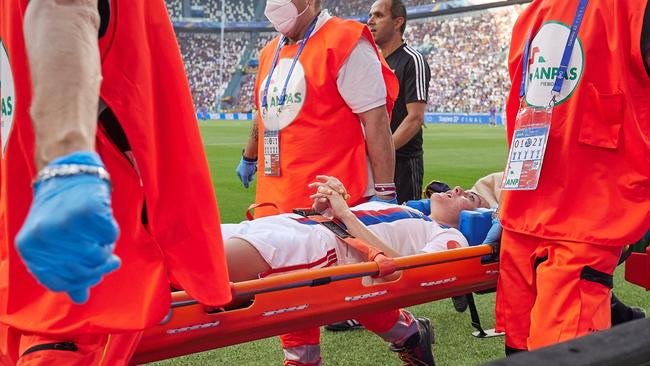
If the rapid-fire ticket sales are any guide, Carpenter may be underestimating the reception that awaits her and the Matildas.
The World Cup, to run from July 20 to August 20, jointly hosted by Australia and New Zealand, will see an estimated 83,000 watch Australia’s opening match against Ireland at Sydney’s Accor Stadium – more than double the Matildas’ previous highest attendance of 36,000. The opening match was moved from the 42,500-seat Sydney Football Stadium to the 83,000-seat Stadium Australia (known as Accor Stadium for sponsorship purposes) to meet the surging demand for tickets. At least 1.5 million people are expected to attend the games in Australia and New Zealand with an estimated worldwide audience of two billion. FIFA predicts the World Cup will encourage up to 400,000 girls to take up soccer in Australia.
“It’s crazy now, women’s football,” says Carpenter. “I’ve seen it go from here to here,” she says, moving her hands towards the sky.
Marketing surveys show the Matildas have overtaken the men’s Wallabies rugby union team in popularity, something that would once have seemed unthinkable for a team that only formed in 1978 and for years had to play on substandard ovals. The small crowds that came to watch them play in those days were mostly family and friends.
“It’s incredible to see where this team has come from to be one of our biggest sporting brands … so many players have paved the way for this moment,” says Heather Garriock, who played 130 games for the Matildas between 1999 and 2011.
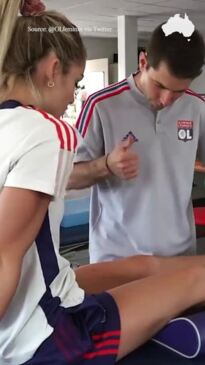
For years Matildas players were paid a pittance, having to hold down second jobs while playing for the national team. In the early days one player recalled how a teammate called the coach before an international match to say she would be late because her shift at Woolies didn’t finish until 5.30pm. In the lead-up to the 2000 Sydney Olympics, the Matildas were so desperate to secure sponsorship and public support that 12 of them posed naked for a calendar to get attention. Fast-forward to today and the Matildas are a household name, and Kerr is arguably the most recognisable Australian sports star in the world. In May, wearing a sharp black suit, she carried the Australian flag into Westminster Abbey for the coronation of King Charles III.
But it will take more than Kerr’s soccer royalty for the Matildas to realise their dream of winning a home World Cup.
On a cold spring evening in London on the eveof the coronation, Kerr is playing to script, slamming the winning goal for her team Chelsea against Liverpool with just minutes to go. As she leaves the ground I ask her what she thinks about having Carpenter back with the Matildas for the World Cup. “Ellie is one of the best players in the world,” says Kerr, who described Carpenter as “irreplaceable” when she injured her ACL last year. “We’ve missed her and she’s a great personality to have on the team … I’m feeling good, I’m feeling excited [about the World Cup].”
A few days later, Carpenter is sprinting up the right wing, weaving the ball around her teammates during morning training near the Parc Olympique Lyonnais stadium on the outskirts of Lyon. It is just over two months since she made her comeback from her injury and the previous weekend she was one of the team’s best players in their 3-0 win over Dijon.
She calls out to her teammates in French and jokes with them in French, but if she makes a mistake on the field, the word “shit” rings out across the ground in an Aussie twang.
Her bilingual world in Lyon, a French foodie capital crammed with UNESCO World Heritage sites, is a reminder of just how many lives Carpenter has squeezed into her 23 years. “It all started here,” she says, pointing to a tattoo on her ankle that shows the outline of Cowra, her hometown of 12,500 people in the Central West of NSW. “It’s like one main street, two sets of traffic lights, a place where we knew everyone and everyone knew the Carpenters.”
Looking back, Carpenter’s unlikely rise from the streets of Cowra to international soccer star was both a blessing and a curse. It was a blessing because she lived the real-life sporting fairy-tale. This was the tale in which a determined young country girl becomes a prodigy of the game, shattering every barrier in her path to find herself playing for Australia at the age of just 15 and then at the age of 16 at the 2016 Rio Olympics, the youngest ever female footballer in the world to compete in an Olympics.
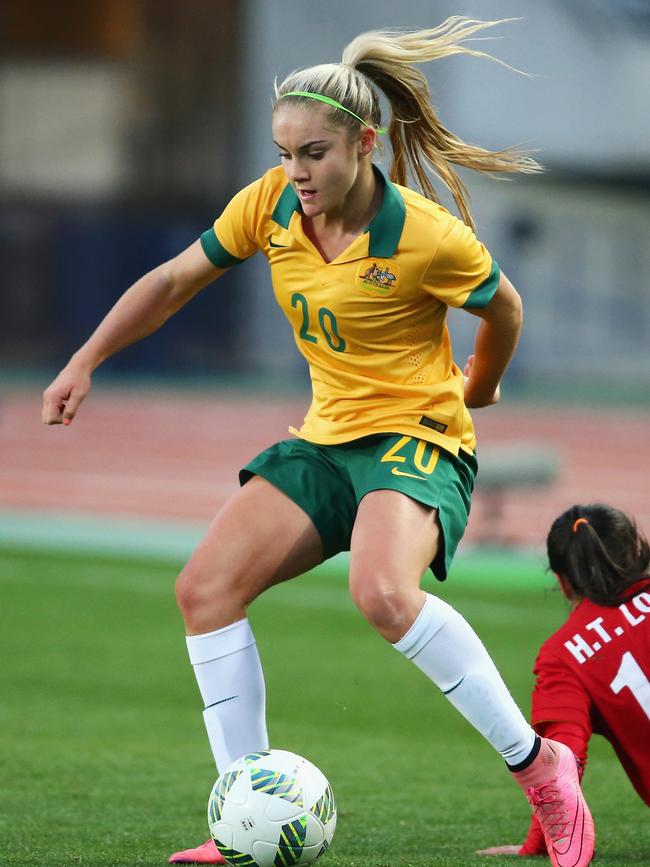
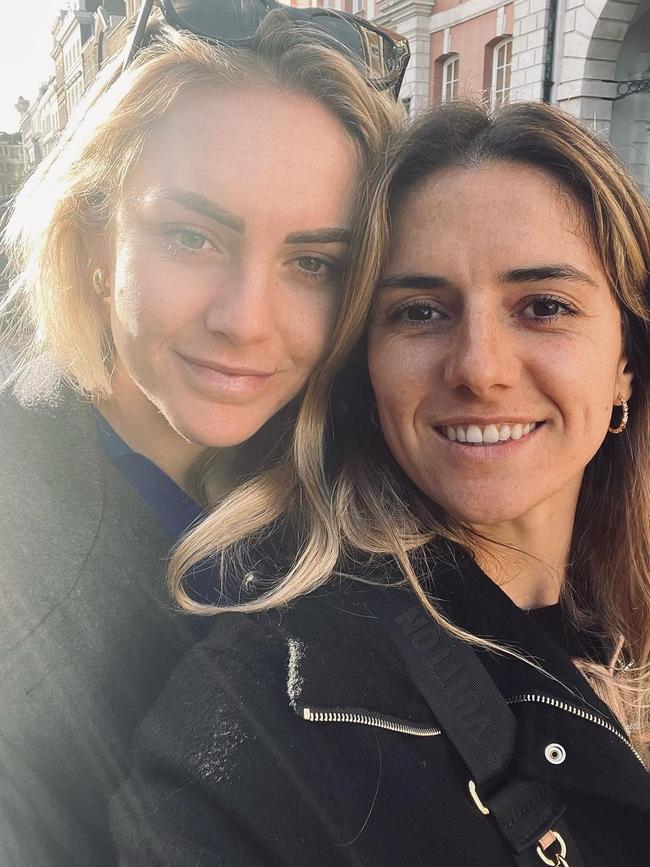
The curse was that she was so good, so early, that she was a kid playing among adults, being thrust into the spotlight ahead of her time, before she was ready and before she had time to grow up. “I hated it sometimes,” she says. “I was always the youngest. People would say, oh, you’re the youngest ever Olympian or you’re the youngest ever to score a goal, the youngest this, the youngest that. I was playing with people who were 10 or 15 years older than me and you had to mature very quickly. It was hard with the pressure, the spotlight, the critics … I wasn’t prepared for that at the time.
“I’ve been in the public eye since I was 15 and now people think I’m 30 but I’m still just 23, one of the youngest in the team.”
Belinda Carpenter still scratches her head about how her daughter fell in love with soccer. “She was highly energetic, she never sat still but she did all sports – a bit of athletics, AFL, soccer, cricket, even triathlon, cheerleading and trapeze,” she says. Belinda and her then husband Scott, who were Physical Education teachers in Cowra, encouraged Carpenter and her older brother Jeremy to dabble in any activity that took their fancy. “Ellie also did ballet, so she would play football in the morning and then go to ballet with muddy knees under those pink stockings,” Belinda recalls.
“I think I always knew I would be a sportsperson, because ever since I could walk I was running,” says Carpenter. “I think I could have done any sport really because I was also good at swimming and athletics. I was a tomboy. I didn’t really have a normal childhood. I never went to parties like other girls, I just wanted to play sports.”
She played soccer from an early age but her path as a serious player began by accident when, at the age of about seven, she watched her brother Jeremy train with the NSW country soccer team. “I was just on the sidelines waiting for him, juggling the ball on my own, when the coach came up and said that I could join their next session. I was the only girl and the boys were much older than me. I don’t remember this but apparently I was, like, really good, smashing all the boys.”
Belinda and Scott decided to give both Ellie and Jeremy the chance to compete in competitions across the state. This required a brutal schedule of long drives for training and games. “Honestly I can’t believe they did that for me,” Carpenter says. “From Cowra we used to drive to Canberra every Tuesday, Wednesday and Thursday, which was more than two hours there and back, and then sometimes we would play in Sydney which was four hours there and back on the same day. I would spend so much time in the car, doing my homework or making up quizzes and things just to pass the time.”
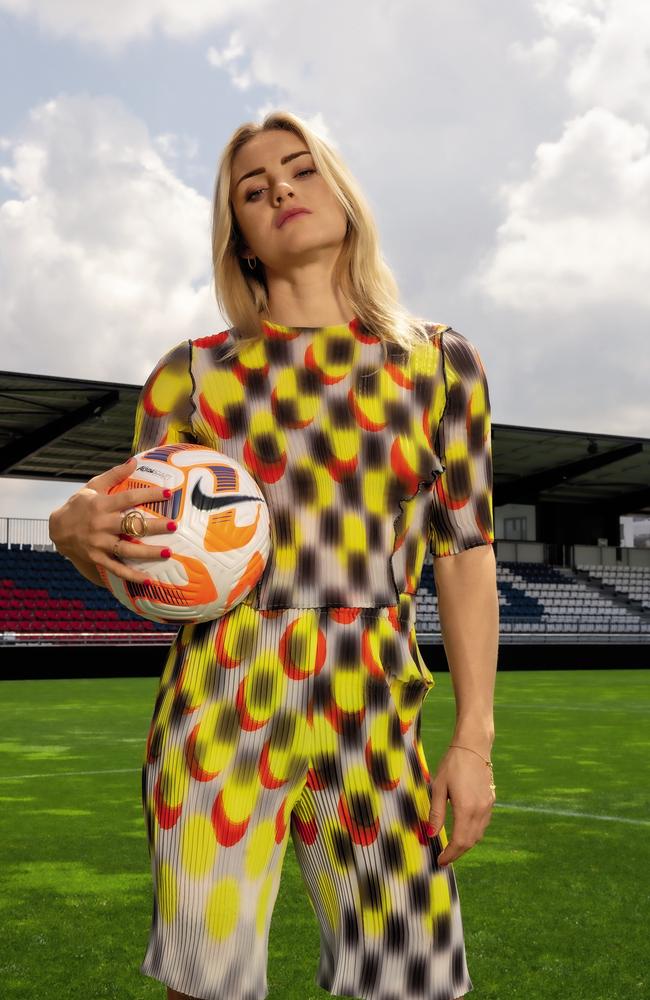
By the time Carpenter was 12, it was clear that she had a natural talent that could no longer be nurtured from Cowra. So Belinda quit her job and moved with both the children to Sydney so they could attend Westfield Sports High School in Sydney’s west, which had a specialist sports program.
It was a big school in a big city, a culture shock for a country girl. “It was a huge change, I became this small fish in a big sea,” she says. Not long afterwards, her parents divorced, a time which she describes as difficult and sad.
The following year, aged 13, Carpenter went to watch the Matildas play in Sydney. “I think there was a maximum of 1000 people there but I watched the national team play and I was like, ‘Oh, sick, I want to be that.’ Then two years later, I was on that team. It was crazy.”
Carpenter’s precocious talent turned heads in the soccer world at that time, and things unfolded quickly. She broke into the “Mini-Matildas” under-17 team at the age of 14, and when she turned 15 signed her first professional contract with the then W-League club Western Sydney Wanderers. The coach was so impressed with her that she didn’t even need to trial for the team.
Carpenter’s ambition was such that although she began her career as a midfielder, she volunteered to be a defender when the Mini-Matildas said they needed defenders only because she didn’t want to be cut from the squad. “I was like, I want to be in the team so I will play wherever.”
In March 2016, when she was still just 15, Carpenter made her debut for the senior Matildas, playing in a 9-0 victory over Vietnam.
Not long afterwards, she was playing for Australia in the Rio Olympics, the first of the string of “youngest ever” firsts that she would soon tire of. “Obviously I was so young – I think I was the youngest in that team by five years,” she recalls. “So I guess I was kind of on my own. Some players were 30 years old and some of them were a bit like, ‘Who is this 15-year-old who has come into the team?’ and some people don’t want you there because you might take their spot. So some didn’t like me being there, but you’ve just gotta keep going.”
After the Rio Olympics, Heather Garriock, who was then coaching, says she noticed that the 16-year-old Carpenter was struggling. “I could see that she wasn’t doing well with the massive comedown after the hype of the Olympic Games. So, you know, I just put my arm around her – and since then I’ve always put my arm around her and taken her under my wing. She just wanted to be the best and to get better every day.
“She is so driven to win and yet she’s got such a nice nature, a very humble kind of girl who will always give you her time.”
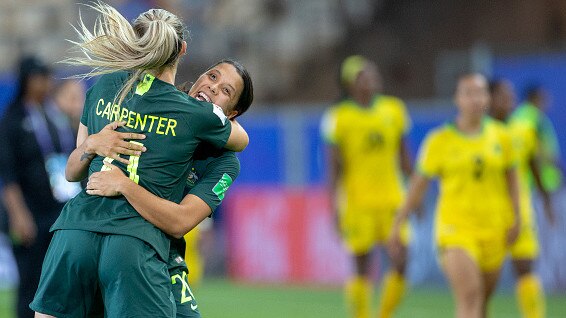
Carpenter says she was forced to grow up quickly, but with the help of people like Garriock she eventually found her rhythm and adapted to the ever-growing public glare of being a Matilda. “I think it took me a couple of years, until I was about 17, to come out as Ellie,” she says.
In Year 10 Carpenter dropped out of school to pursue her dream of being a full-time footballer. “She wasn’t at school very much anyway,” says Belinda of her daughter’s busy soccer schedule. “I just told her, ‘Go do it, because if it fails and you don’t get to where you want to go in soccer, we will go back and figure out the education route’.”
When Carpenter was 17 she was pursued by the US National Women’s Soccer League team Portland Thorns, in Oregon on the US west coast. She signed with them but, in those days, women were not allowed to play until they turned 18. The club was so keen for her to play that she signed a contract literally on her 18th birthday, and played the following week, racking up yet another series of “youngest evers”. “That’s why I was the youngest ever player and the youngest ever person to score a goal in the NWSL at that stage,” she says.
Carpenter says life in the US was a shock “because it was so different to Australia”. Belinda recalls that her daughter would often FaceTime her during dinner just to have a companion to speak with. “Until she found her feet I would often hang out with her on the phone while she was having dinner at a restaurant or something when she didn’t really know anybody.
“Even though Ellie is really outgoing, with a wicked sense of humour, I think she is also a bit guarded about who she lets in.”
Even so, Carpenter says she enjoyed her two years in Portland where she regularly played in front of crowds of 20,000. By this stage she had become a fixture of the Matildas team, playing in the 2019 World Cup in France where they made it to the round of 16 and then the 2020 Tokyo Olympics where the Matildas made it to the semi-finals.
By the time she turned 20, Carpenter was being pursued by the strongest women’s team in the world, Olympique Lyonnais. She recalls the moment she learned that Lyon wanted to recruit her. “I was like, ‘Are you serious?’ It was Lyon and I was like, ‘Are you sure they want me?’ I mean, if Lyon calls, you go to them wherever you are because they are the best in the world.” This is no exaggeration – the team has won eight Champions League finals in the past 12 years, including five in a row between 2015 and 2020.
But Carpenter’s arrival in 2020 wasn’t so easy. “It was the time of the Covid pandemic so the city was shut. I didn’t know anyone, and I didn’t know French,” she says. So she began her life anew yet again, throwing herself into French lessons and making friends at her new club. She impressed local fans by trying to speak French at press conferences, albeit with an Aussie twang. She also fell in love with Lyon itself. “I love it, it’s beautiful – not as nice as Sydney, but it’s still beautiful.” As soon as she arrived, she also saw why her new team kept winning championships. The fitness, the training, the skills were next-level, even for Carpenter. “She called me up and said, ‘Um, Mum, these players are really, really good’,” recalls Belinda. Initially she found it hard to break into her new team, and she won her first European Championship with Lyon in 2020 without taking to the field when she was on the team as an unused sub.
“I don’t think many people understand what it really takes to be a football player,” says Carpenter’s teammate and partner Danielle van de Donk. “You win trophies and everyone thinks it is a high but no one really knows about the lows.” Van de Donk, who has been going out with Carpenter for about two years, says she has the rare ability to lift the team’s morale single-handedly. “She is the most energetic person I know, she is very, very positive, and off the pitch she just brings a different kind of energy to the room – even when she was injured the coaches were saying to her, ‘Bring your energy to the team, we need it’,” says van de Donk. “She is already a star but she is just going to get bigger and bigger. She is only 23.”
Van de Donk says she’s attracted to Carpenter because they are “similar people in life”, adding: “It’s kind of wild, she is from Australia, I’m from the Netherlands and we are buying a house in Lyon – it’s very cool.’’
After that tricky start at Lyon, Carpenter became a regular in the team – until the 13-minute mark of last year’s Champions League final. “It was just sickening to watch her go down,” recalls Belinda, who was watching the game live in the middle of the night from her home in Wamberal on the NSW Central Coast. “I actually said when I watched it, ‘She does not go down and she does not stay down’.”
Carpenter’s injury came in two parts. The first came when she was tackling an opponent near the corner post and her left knee twisted in the tackle. Carpenter hobbled off in obvious pain. But she was desperate to come back on, and tested the injured knee in front of the team’s medical staff. “I remember being on the sideline and they were testing me and I was like, ‘Is it strong, can you feel my ACL?’ And they were like, ‘Yeah I think it’s fine, so you want to go back on?’ and I’m like, ‘Yeah, it’s the Championship Final.’ So I ran back on and then I was like, ‘Oh, something’s not right’.”
Back in Wamberal, Belinda was horrified to see her daughter run back onto the pitch. “We were like, ‘No, no, no, don’t do it’,” she recalls.
Moments after returning to the field Carpenter moved to intercept a long pass. But as soon as she changed direction her knee gave way completely, severing her ACL and sending her to the ground.
Van de Donk, who was watching from the sidelines as a substitute, had torn her own ACL as a teenager and knew what lay ahead. “I saw her go down and instantly I knew it was wrong,” she recalls. “It was horrible to watch.”
But once Carpenter counted the months and realised she could still potentially play in the World Cup in Australia, her mood lifted. Lyon won the match 3-1, giving Carpenter her second championship medal and yet another first as the only Australian to win two Champions League medals. After the match, despite having her injured leg in a splint, Carpenter joined her teammates in the celebrations on the field, swinging precariously on her crutches and then hopping on her one good leg as she held up the Champions League cup. She then flew back to Lyon with the team and continued the celebrations. “I was in so much pain, so I just took lots of painkillers but we went to a restaurant and partied in Lyon drinking champagne until 5am.”
The next morning Carpenter woke with a hangover to the bad news she had feared. She needed a full knee reconstruction and would be out of the game for up to a year. Recalls Belinda: “The first thing she said to me on the phone was, ‘I’m getting an operation, I’m going to get better and I’m going to play in the World Cup’. It was all about the World Cup.”
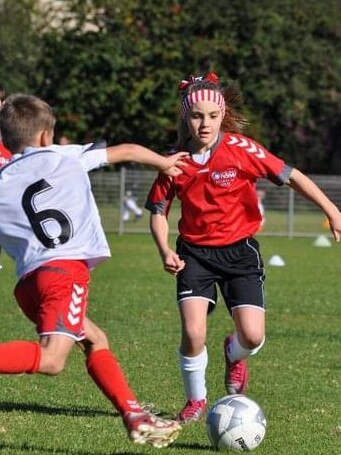
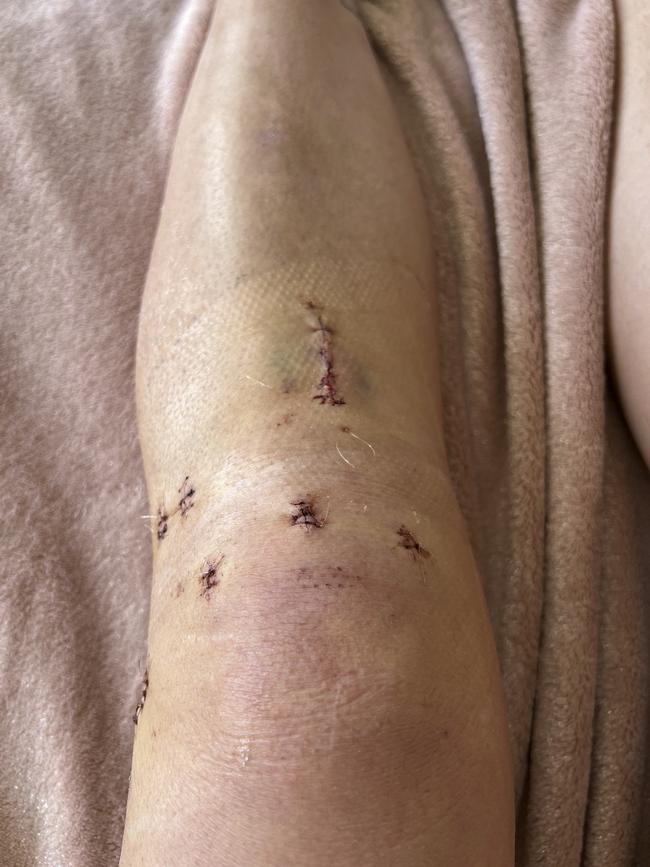
That has been Carpenter’s singular goal ever since. In those early months after her injury when she could not run, she followed her rehab plan like it was Holy Writ – long hours in the gym keeping the muscles working followed by swimming, physio, massage and the hardest task of all: patience.
“I had to learn a lot about patience because I am impatient,” she says. “When I finally was able to take my first jump again I actually cried with happiness.”At times Carpenter wondered whether she would be the same player when she returned, but mostly she says she kept her mental demons at bay.
“It was a long journey for her and she was a bit insecure in the beginning, she struggled for about three weeks,” says van de Donk. “But after that she was OK, she just powered through – and now I think she’s much stronger than she was.” Carpenter, for her part, puts a gloss on the whole saga, saying she believes it gave her a much-needed break from the game she’d been playing almost non-stop since she was a child.
Today, Carpenter’s football routine is very full-time. She goes into the club from around 9am to 4pm most days to do a mixture of training, gym, recovery and sponsorship work. Then she plays on weekends, often travelling. She works with a nutritionist and also a psychologist. She estimates she gets one day properly off each month. Such is the profile of the team in Lyon that she now gets recognised in the street, and after three years here she says she is now fluent in French.
“Ellie has always known the path that she wanted and she has just followed it completely. That is pretty incredible for a 23-year-old,” says former Matildas player Garriock. “She is already one of the world’s best players and her energy and leadership are crucial for the World Cup. She has achieved things at 23 that others wouldn’t achieve in their whole career. I have no doubt that she will be the captain of the Matildas in the future. She has all the leadership qualities and the big game experience.”
Carpenter is now on the home stretch of her quest, hoping to stay in form and avoid injury until the World Cup begins in three weeks.
Although she loves playing for Lyon, she says there’s nothing like going home to play with the Matildas. “It’s like going back to your family,” she says with a grin. “We’ve all known each other for years. Everyone is so close. We can all laugh at ourselves and we look after each other. It’s such a good, strong group. I don’t know how to explain it but I have a special passion when I play for the Matildas, it’s unique. For me, this World Cup is the top of the top, it’s probably the best thing I will ever experience.”
So how far can Carpenter and the Matildas go in this World Cup?
“We’ve never seen an Australian team like this,” says Garriock. “This core group of players like Ellie Carpenter, Sam Kerr and Caitlin Foord have played together in World Cups and big tournaments since they were 16 years old. They are in their prime and this is their moment. It is written for them.”






To join the conversation, please log in. Don't have an account? Register
Join the conversation, you are commenting as Logout